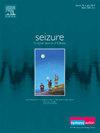Deep brain stimulation of the anterior nucleus of the thalamus reduces the risk for status epilepticus in focal drug-resistant epilepsy
IF 2.7
3区 医学
Q2 CLINICAL NEUROLOGY
引用次数: 0
Abstract
Objective
Deep brain stimulation (DBS) of the anterior nucleus of the thalamus (ANT) is a third-line treatment option for patients with refractory focal epilepsy. However, the effect on recurrent episodes of status epilepticus (SE) after ANT-DBS implantation has not been systematically investigated. Here, we set out to determine whether ANT-DBS has a preventive clinical effect on the risk of SE in difficult-to-treat epilepsies.
Methods
We performed a retrospective, monocentric analysis in a cohort of patients with refractory epilepsy who received bilateral DBS implantation in the ANT (n = 24). Medical records were reviewed to compare the total number of SE in each patient before and after surgery.
Results
Out of 24 patients, 11 (46 %) had 20 episodes of SE preoperatively, 17 of which were unprovoked. Postoperatively, only 2 patients developed SE, one of which was provoked. The relative annual risk of SE in this cohort was reduced from 28.8 % (per patient year) preoperatively to 1.9 % postoperatively, demonstrating a statistically significant reduction in SE incidence with ANT-DBS (p < 0.005). Survival analysis confirmed significantly longer status-free survival postoperatively.
Conclusion
ANT-DBS may be beneficial as a preventive intervention in patients with refractory epilepsy at high risk for recurrent SE.
求助全文
约1分钟内获得全文
求助全文
来源期刊

Seizure-European Journal of Epilepsy
医学-临床神经学
CiteScore
5.60
自引率
6.70%
发文量
231
审稿时长
34 days
期刊介绍:
Seizure - European Journal of Epilepsy is an international journal owned by Epilepsy Action (the largest member led epilepsy organisation in the UK). It provides a forum for papers on all topics related to epilepsy and seizure disorders.
 求助内容:
求助内容: 应助结果提醒方式:
应助结果提醒方式:


